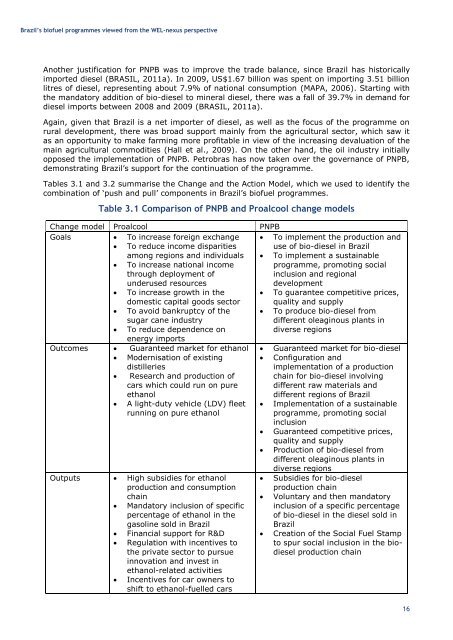Brazilian Biofuels Programmes from the WEL Nexus Perspective
Brazilian Biofuels Programmes from the WEL Nexus Perspective
Brazilian Biofuels Programmes from the WEL Nexus Perspective
- No tags were found...
You also want an ePaper? Increase the reach of your titles
YUMPU automatically turns print PDFs into web optimized ePapers that Google loves.
Brazil’s biofuel programmes viewed <strong>from</strong> <strong>the</strong> <strong>WEL</strong>-nexus perspectiveAno<strong>the</strong>r justification for PNPB was to improve <strong>the</strong> trade balance, since Brazil has historicallyimported diesel (BRASIL, 2011a). In 2009, US$1.67 billion was spent on importing 3.51 billionlitres of diesel, representing about 7.9% of national consumption (MAPA, 2006). Starting with<strong>the</strong> mandatory addition of bio-diesel to mineral diesel, <strong>the</strong>re was a fall of 39.7% in demand fordiesel imports between 2008 and 2009 (BRASIL, 2011a).Again, given that Brazil is a net importer of diesel, as well as <strong>the</strong> focus of <strong>the</strong> programme onrural development, <strong>the</strong>re was broad support mainly <strong>from</strong> <strong>the</strong> agricultural sector, which saw itas an opportunity to make farming more profitable in view of <strong>the</strong> increasing devaluation of <strong>the</strong>main agricultural commodities (Hall et al., 2009). On <strong>the</strong> o<strong>the</strong>r hand, <strong>the</strong> oil industry initiallyopposed <strong>the</strong> implementation of PNPB. Petrobras has now taken over <strong>the</strong> governance of PNPB,demonstrating Brazil’s support for <strong>the</strong> continuation of <strong>the</strong> programme.Tables 3.1 and 3.2 summarise <strong>the</strong> Change and <strong>the</strong> Action Model, which we used to identify <strong>the</strong>combination of ‘push and pull’ components in Brazil’s biofuel programmes.Table 3.1 Comparison of PNPB and Proalcool change modelsChange model Proalcool PNPBGoals To increase foreign exchange To implement <strong>the</strong> production and To reduce income disparitiesamong regions and individuals use of bio-diesel in BrazilTo implement a sustainable To increase national incomethrough deployment ofunderused resourcesprogramme, promoting socialinclusion and regionaldevelopment To increase growth in <strong>the</strong> To guarantee competitive prices,domestic capital goods sector To avoid bankruptcy of <strong>the</strong>sugar cane industry To reduce dependence onenergy importsOutcomes Guaranteed market for ethanol Modernisation of existingdistilleries Research and production ofcars which could run on pureethanolA light-duty vehicle (LDV) fleetrunning on pure ethanolOutputs High subsidies for ethanolproduction and consumptionchain Mandatory inclusion of specificpercentage of ethanol in <strong>the</strong>gasoline sold in BrazilFinancial support for R&DRegulation with incentives to<strong>the</strong> private sector to pursueinnovation and invest inethanol-related activitiesIncentives for car owners toshift to ethanol-fuelled carsquality and supplyTo produce bio-diesel <strong>from</strong>different oleaginous plants indiverse regionsGuaranteed market for bio-dieselConfiguration andimplementation of a productionchain for bio-diesel involvingdifferent raw materials anddifferent regions of BrazilImplementation of a sustainableprogramme, promoting socialinclusionGuaranteed competitive prices,quality and supplyProduction of bio-diesel <strong>from</strong>different oleaginous plants indiverse regionsSubsidies for bio-dieselproduction chainVoluntary and <strong>the</strong>n mandatoryinclusion of a specific percentageof bio-diesel in <strong>the</strong> diesel sold inBrazilCreation of <strong>the</strong> Social Fuel Stampto spur social inclusion in <strong>the</strong> biodieselproduction chain16
















